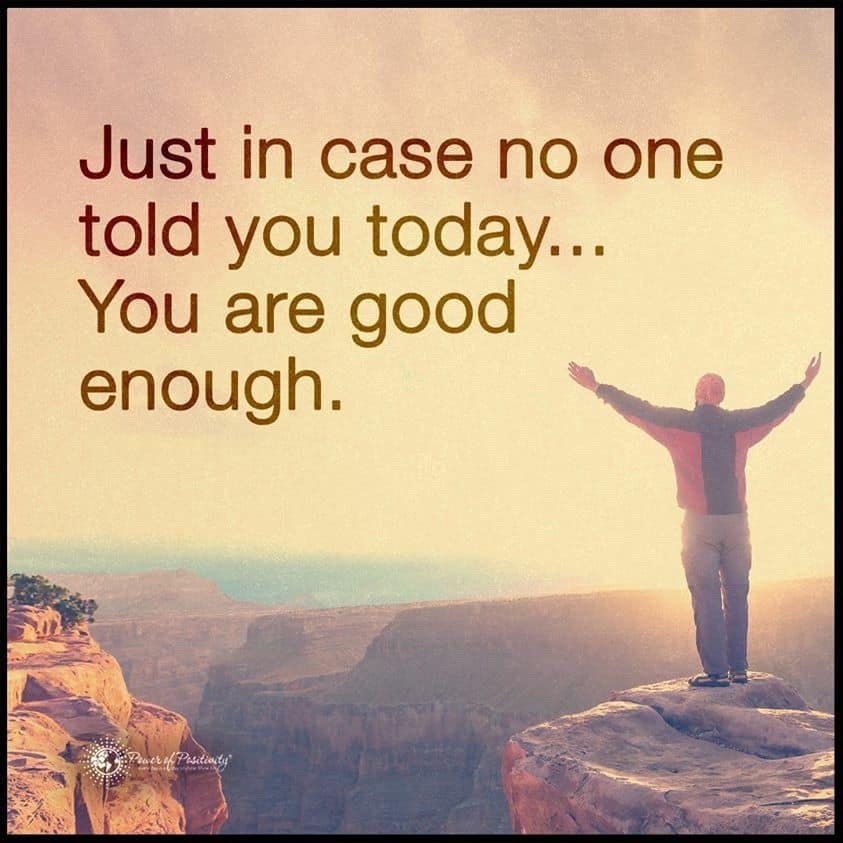People have lots to say about everyone and everything. Those opinions can shape your own perspectives, including your view of yourself. If you care too much about other people’s opinions, a lack of their reassurance can tank your confidence levels.
Living your life by the standards and validation of others is not healthy. But how can you stop this cycle and move towards more positive methods of maintaining your self-esteem? Here are 11 ways to boost your self-confidence to stop seeking reassurance from others.
1. Think About Your Reassurance-Seeking
One of the first things you should do if you constantly seek reassurance is to confront that behavior. What are your motives? What triggers the behavior?
Your goal is to do the following:
- Examine your reassurance-seeking actions and understand why it happens
- Catch yourself before you perform reassurance-seeking behavior and stop yourself from following through
- Ask yourself why your own opinion is not sufficient, and to make it sufficient for you
2. Examine Your Confidence
Sometimes, to boost self-confidence, you need to understand better what your personal relationship with confidence is. To do this, start by choosing two different memories: one from when you felt self-confidence and one where you lacked it. Then, ask yourself these questions for each memory:
- How did the situation occur?
- What did you tell yourself as the situation was occurring? How about any thoughts you had?
- What sort of feelings do you remember having? Were there any notable physical sensations that you felt?
- What happened as a result of these cumulative factors?
- How did you feel after these results occurred?
Now, use your two sets of answers – one for each memory, to reflect on what you’ve learned about your confidence and who you are.
Ask yourself these questions:
- What did I do well that caused me to feel confident?
- Why wasn’t that factor present when I lacked confidence?
- What can I do to help myself feel more confident, based on what has worked before?
- What sort of things empower me? How can I make them a part of my everyday life?
3. Quit The Comparisons
It’s easy to compare yourself to the people around you in a vague attempt at seeking validation. You try to measure up to the people you see and how they present themselves, trying to become as positive as you think they are. But research has shown that envy is directly related to self-perception, so it’s time to stop!
The truth is that comparisons aren’t fair or possible, and they don’t work. Here are a few reasons why:
- Most people present the best sides of themselves to others, not their flaws or weaknesses.
- Everyone has their own journey in life and is influenced by millions of tiny factors in their past and present, making true, fair comparisons inherently impossible.
- Believing others are better than you should be used for motivation, not a reason to beat yourself up
- Life isn’t a race or a competition, and you can take your time to arrive at your goals.
4. Create Boundaries and Definitions
The use of clearly defined boundaries, concepts, and goals is beneficial in any personal growth journey. When you’re trying to build confidence, though, it’s advantageous. It allows you to reclaim ideas and parts of you that will contribute to your overall movement towards self-assurance. Here are some things you should define:
· Personal Boundaries
Know where your personal limits are, inform those around you of them, and create plans to enforce them if they’re crossed. This will get you into the habit of standing up for yourself, even if it makes others unhappy.
· Values
What are your personal values? Where do you stand on different issues? What are your morals? These are things you shouldn’t compromise on. Learning to stand by these values gives you integrity and lets you practice your ability to stay confident in the face of others’ disapproval.
· Success
What, to you, is a measure of success? Defining this will allow you to feel accomplished when you meet that definition, giving you the chance to improve your self-esteem with every achievement.
5. Be Kind To Yourself
Practicing self-compassion means being kinder and gentler to yourself. After all, most people have an easy time being harsh on themselves and are harder on themselves than everyone around them. That’s why this is so important. Plus, studies indicate that self-compassion has positive effects on confidence and self-esteem.
When you are kind to yourself, you:
- Don’t punish or berate yourself for making an error or experiencing failure.
- Use positive terms to refer to your everyday actions.
- Take each negative event as motivation to learn and move forward.
- Never call yourself names.
- Pat yourself on the back when you do well
- Have the ability to laugh at yourself
6. Keep A Confidence Journal
Writing in itself can be quite therapeutic, but that’s not the only reason to get into the habit of keeping a journal. A journal can help you monitor your progress, express your emotions, write your thoughts, and reflect on your growth and journey.
A confidence journal will be a bit more specific than a simple everyday record. It should have space dedicated to the daily expression of confidence and personal self-reassurance. Here are some prompts to use when writing in this journal:
- Today, I did well by…
- I accomplished…
- I felt terrific about myself when…
- Today, I had a lot of fun because…
- Today, I saw this good thing happen…
- I was proud of myself when…
- Today, I had this positive experience…
What does this accomplish? Well, it allows you to look back and see just how much you’re capable of, how many wonderful things happen in your life, and how your perspective can be altered. It’s a great way to build your confidence over time slowly.
7. Experiment With Challenges
Your brain will often tell you that you can’t do anything. Learn to fight those instincts by challenging your brain. Run “experiments” where you see what will happen if you fight your brain’s messages and your own negative self-talk. Face those challenges with as much positive thinking as you can.
If you have trouble working up the nerve, really lean into the “experiment” aspect. You’re just curious, and you’re just trying it out to see what will happen. You might surprise yourself by how well it turns out, or how little a couple of errors really matter in the end, or how much you’ve learned in exchange for a minor failure.
Here are some great ways to experiment with challenges:
· Stand At Your Comfort Zone’s Edge
Stretch your way towards the outside of your comfort zone – far enough to feel a little uncomfortable, but not enough to overwhelm yourself.
· Face Fears
What are you afraid of? Try challenging those beliefs and overcoming those fears with slow and steady exposure.
· Try New Things
Learn new skills, take classes, and let yourself be bad at brand new experiences. It’s okay to be a beginner again, and a learner’s mindset is an ever-growing one!
· Question Beliefs
What values and beliefs do you hold at your core? Examine them closely. Do you still really believe them? Have you outgrown them? Is there more to be learned?
8. Help Others
Helping others is a fantastic way to build confidence because it shows you that you’re capable of making a difference in someone’s life. It allows you to utilize the skills you have to solve a problem and make someone smile.
If you really want to challenge yourself, you can become a mentor or teacher to someone and help them that way. This will allow you to hone your leadership and guidance skills while gaining confidence through your hard work bearing fruit in the person you’re teaching.
You can also offer support to others. It’s powerful to see how just being there for someone can make someone feel so much better. How can you not get a little self-esteem boost when you see that such power lies within you?
9. Care For Your Physical Health
If you aren’t making sure that your body is in good health, it’s easy for your self-esteem to drop. Studies indicate that caring for your body can improve positive thinking regarding body image, thus increasing confidence levels.
You don’t need to turn into a total gym rat to benefit from self-confidence from physical health. Just:
- Perform moderate exercise regularly
- Get enough sleep
- Eat a relatively balanced diet.
- Take care of yourself when you get sick.
10. Become Comfortable With Self-Doubt
Many times, your self-doubt will get in the way of you doing what you want to do. You may tell yourself something like, “When I’m more confident, I’ll do this!”.
But here’s a little secret: even the most confident people face self-doubt. They have to power through it with courage and the confidence that they will handle any challenges. They’ve become comfortable with moments like this and are happy to face challenges head-on.
The truth is, oftentimes, the most positive ways to gain confidence involve facing your self-doubt and running with it. It’s good to prepare before jumping in, and practicing can help you gain the confidence to conquer the doubt. But at the end of the day, you’ll never know what you’re capable of if you don’t go for it!
11. Celebrate Your Successes
Have you done well at something, achieved a goal, or found some form of even very minor success? Celebrate it by talking yourself up! Your confidence will get a huge boost when you actively acknowledge the good parts of you as much as you naturally focus on the bad.
It can feel a little odd to pat yourself on the back when you first try getting into the habit but don’t worry. Before long, you’ll start doing so more naturally. Here are some examples of what to celebrate.
- Compliments that someone gives you
- Reaching a certain accomplishment.
- Noticing positive changes in yourself
- Finishing your to-do list
- Handling a difficult situation
Final Thoughts On Some Ways To Boost Your Self-Confidence To Stop Seeking Reassurance From Others
Confidence is a beautiful thing, and it’s not to be taken for granted. Building your self-confidence allows you to feel assured and happy with yourself, even without anyone else’s approval.

















 Community
Community

